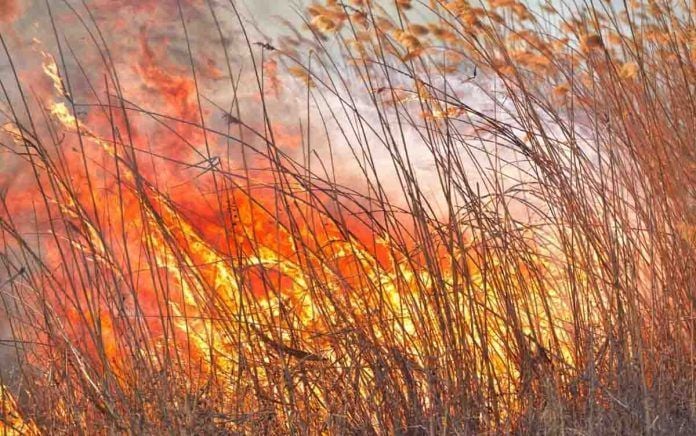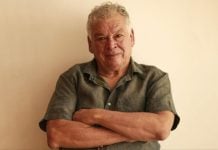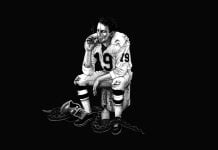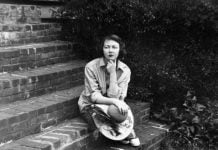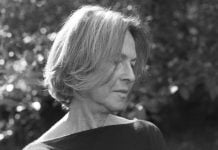Averno
Averno. Nombre antiguo: Avernus. Pequeño lago en un cráter, veinte kilómetros al oeste de Nápoles, Italia, considerado por los antiguos romanos como la entrada al inframundo.
1
Mueres cuando tu espíritu muere.
De lo contrario, vives.
Quizás no lo hagas bien, pero continúas—
porque no tienes otro remedio.
Cuando le digo esto a mis hijos
no prestan atención.
Los viejos, piensan mis hijos—
esto es lo que hacen:
hablar de cosas que nadie puede ver
para encubrir las células muertas que van perdiendo.
Intercambian un guiño;
escuchan al viejo hablar del espíritu
porque ya no recuerda la palabra “silla”.
Es terrible estar sola.
No me refiero a vivir sola—
estar sola, donde nadie te oye.
Recuerdo la palabra para decir “silla”.
Quiero decir—es que ya no me interesa.
Me desperté pensando
tienes que prepararte.
Pronto el espíritu se rendirá—
todas las sillas del mundo no te servirán.
Sé lo que dicen cuando salgo del cuarto.
Debería ver a alguien, debería estar tomando
alguna de las nuevas medicinas para la depresión.
Puedo oírlos, cuchicheando, cómo dividirán el costo.
Y quisiera gritar
ustedes todos viven en un sueño.
Ya bastante malo es, piensan, ver cómo me deshago.
Bastante malo es, sin esos sermones que reciben ahora
como si yo tuviera algún derecho a la nueva información.
Bien, ellos tienen el mismo derecho.
Ellos viven en un sueño y yo me preparo
para ser un espectro. Quiero gritar
la niebla se ha despejado—
es como una vida nueva:
no te interesa el desenlace;
conoces el desenlace.
Piénsalo: sesenta años sentándome en sillas. Y ahora el espíritu mortal
buscando tan abiertamente, tan osadamente—
Levantar el velo.
Para mirar a qué le dices adiós.
2
No regresé en largo tiempo.
Cuando vi el campo otra vez, el otoño había terminado.
Aquí, termina antes de haber comenzado—
los viejos ni siquiera tienen ropa de verano.
El campo estaba cubierto de nieve, inmaculado.
No había ni un signo de lo que había pasado aquí.
No sabías si el labriego
había replantado o no.
Tal vez se cansó y se mudó a otra parte.
La policía no prendió a la muchacha.
Pasado un tiempo, dijeron que se había ido a otro país,
uno donde no hay campos.
Un desastre como este
no deja marcas en la tierra.
Y gente como esa—cree que les ofrece
un nuevo comienzo.
Me quedé largo rato mirando a la nada.
Después de un momento noté qué oscuro estaba, qué frío.
Un gran rato —no recuerdo qué largo.
Una vez que la tierra decide no tener memoria
de alguna manera el tiempo parece insignificante.
Pero no para mis hijos. Me asedian
para que haga testamento. Les preocupa que el gobierno
se quede con todo.
Deberían venir conmigo alguna vez
a ver este campo cubierto de nieve.
Todo está escrito ahí.
Nada: no tengo nada que darles.
Esa es la primera parte.
La segunda es: no quiero que me quemen.
3
De un lado, el alma divaga.
Del otro, seres humanos viviendo con miedo.
En el medio, el foso de la desaparición.
Unas muchachas me preguntan
si no estarán en peligro cerca del Averno—
tienen frío, quieren ir al sur un ratito.
Y una dice, como en chiste, pero no demasiado al sur.
Digo, tan seguro como en cualquier parte,
y eso las alegra.
Significa que nada es seguro.
Te montas en un tren, y desapareces.
Escribes tu nombre en el cristal, y desapareces.
Hay lugares así por todas partes,
lugares a los que entras de joven
y de los que nunca retornas.
Como el campo, aquel que ardió.
Después, la muchacha se fue.
Quizás no existía,
no tenemos prueba de una cosa o la otra.
Todo lo que sabemos es:
el campo ardió.
Pero eso lo vimos.
Así que tenemos que creer en la muchacha,
en lo que hizo. De otra manera
son sólo fuerzas que no entendemos
las que rigen la tierra.
Las muchachas están contentas, pensando en sus vacaciones.
No tomen un tren, les digo.
Escriben sus nombres en el cristal empañado del tren.
Quiero decir, ustedes son muchachitas buenas,
tratando de dejar detrás sus nombres.
4
Pasamos todo el día
navegando el archipiélago,
pequeñas islas que eran
parte de la península
hasta que se deshacían
en los fragmentos que ves ahora
flotando en las aguas marítimas del norte.
Me parecían seguras,
creo que porque nadie puede vivir allí.
Más tarde, sentados en la cocina
vimos empezar la noche y después la nieve.
Primero una, después la otra.
Nos quedamos en silencio, hipnotizados por la nieve
como si alguna turbulencia
que hubiese estado oculta
se hiciera visible,
algo dentro de la luz,
ahora expuesto—
En nuestra quietud, nos hacíamos
esas preguntas que los amigos que se tienen confianza
preguntan por pura fatiga,
cada uno esperando que el otro sepa más,
y cuando no es así, deseando que
las impresiones compartidas valgan por una revelación.
¿Hay algún provecho en imponerse a sí mismo
el entendimiento de que uno ha de morir?
Preguntas como esa.
La nieve pesada. La noche negra
transformada en inquieto aire blanco.
Algo que nunca habíamos visto revelado.
Aunque el sentido no se reveló.
5
Después del primer invierno, el campo comenzó a crecer otra vez.
Pero ya no estaban los surcos ordenados.
El olor del trigo persistía, una especie de aroma aleatorio
mezclado con varias hierbas, para las que
ningún uso humano ha sido inventado.
Era desconcertante—nadie sabía
adónde había ido el campesino.
Algunos creían que había muerto.
Alguien dijo que tenía una hija en Nueva Zelandia,
que se había ido allá a ver crecer
a sus nietos en vez del trigo.
Sucede que la Naturaleza no es como nosotros;
no tiene un almacén de recuerdos.
El campo no le tiene miedo a los fósforos
de las muchachas. Tampoco recuerda
los surcos. Es matado, quemado,
y año tras año vuelve a vivir
como si nada hubiera ocurrido.
El campesino mira por la ventana.
Quizás en Nueva Zelandia, tal vez en otra parte.
Y piensa: mi vida ha terminado.
Su vida se expresa en ese campo;
ya no cree más en sacar nada
de la tierra. La tierra, piensa,
me ha subyugado.
Recuerda el día en que el campo se quemó,
no, según él, accidentalmente.
Algo en lo profundo de sí dijo: No puedo vivir con esto,
no puedo enfrentarlo después de un tiempo.
El momento terrible fue la primavera siguiente a que su obra fuera borrada,
cuando entendió que la tierra
no conocía el duelo; que, más bien, cambiaría.
Y que seguiría existiendo sin él.
Averno
Averno. Ancient name, Avernus: a small crater lake, ten miles west of Naples, Italy: regarded by the ancient Romans as the entrance to the underworld.
1
You die when your spirit dies.
Otherwise, you live.
You may not do a good job of it, but you go on —
something you have no choice about.
When I tell this to my children
they pay no attention.
The old people, they think —
this is what they always do:
talk about things no one can see
to cover up all the brain cells they’re losing.
They wink at each other;
listen to the old one, talking about the spirit
because he can’t remember anymore the word for chair.
It is terrible to be alone.
I don’t mean to live alone —
to be alone, where no one hears you.
I remember the word for chair.
I want to say — I’m just not interested anymore.
I wake up thinking
you have to prepare.
Soon the spirit will give up —
all the chairs in the world won’t help you.
I know what they say when I’m out of the room.
Should I be seeing someone, should I be taking
one of the new drugs for depression
I can hear them, in whispers, planning how to divide the cost.
And I want to scream out
you’re all of you living in a dream.
Bad enough, they think, to watch me falling apart.
Bad enough without this lecturing they get these days
as though I had any right to this new information.
Well, they have the same right.
They’re living in a dream, and I’m preparing
to be a ghost. I want to shout out
the mist has cleared —
It’s like some new life:
you have no stake in the outcome;
you know the outcome.
Think of it: sixty years sitting in chairs. And now the mortal spirit
seeking so openly, so fearlessly —
To raise the veil.
To see what you’re saying goodbye to.
2
I didn’t go back for a long time.
When I saw the field again, autumn was finished.
Here, it finishes almost before it starts —
the old people don’t even own summer clothing.
The field was covered with snow, immaculate.
There wasn’t a sign of what happened here.
You didn’t know whether the farmer
had replanted or not.
Maybe he gave up and moved away.
The police didn’t catch the girl.
After awhile they said she moved to some other country,
one where they don’t have fields.
A disaster like this
leaves no mark on the earth.
And people like that — they think it gives them
a fresh start.
I stood a long time, staring at nothing.
After a bit, I noticed how dark it was, how cold.
A long time — I have no idea how long.
Once the earth decides to have no memory
time seems in a way meaningless.
But not to my children. They’re after me
to make a will; they’re worried the government
will take everything.
They should come with me sometime
to look at this field under the cover of snow.
The whole thing is written out there.
Nothing: I have nothing to give them.
That’s the first.
The second is: I don’t want to be burned.
3
On one side, the soul wanders.
On the other, human beings living in fear.
In between, the pit of disappearance.
Some young girls ask me
if they’ll be safe near Averno —
they’re cold, they want to go south a little while.
And one says, like a joke, but not too far south —
I say, as safe as anywhere,
which makes them happy.
What it means is nothing is safe.
You get on a train, you disappear.
You write your name on the window, you disappear.
There are places like this everywhere,
places you enter as a young girl
from which you never return.
Like the field, the one that burned.
Afterward, the girl was gone.
Maybe she didn’t exist,
we have no proof either way.
All we know is:
the field burned.
But we saw that.
So we have to believe in the girl,
in what she did. Otherwise
it’s just forces we don’t understand
ruling the earth.
The girls are happy, thinking of their vacation.
Don’t take a train, I say.
They write their names in mist on a train window.
I want to say, you’re good girls,
trying to leave your names behind.
4
We spent the whole day
sailing the archipelago,
the tiny islands that were
part of the peninsula
until they’d broken off
into the fragments you see now
floating in the northern sea water.
They seemed safe to me,
I think because no one can live there.
Later we sat in the kitchen
watching the evening start and then the snow.
First one, then the other.
We grew silent, hypnotized by the snow
as though a kind of turbulence
that had been hidden before
was becoming visible,
something within the night
exposed now —
In our silence, we were asking
those questions friends who trust each other
ask out of great fatigue,
each one hoping the other knows more
and when this isn’t so, hoping
their shared impressions will amount to insight.
Is there any benefit in forcing upon oneself
the realization that one must die?
Is it possible to miss the opportunity of one’s life?
Questions like that.
The snow heavy. The black night
transformed into busy white air.
Something we hadn’t seen revealed.
Only the meaning wasn’t revealed.
5
After the first winter, the field began to grow again.
But there were no more orderly furrows.
The smell of the wheat persisted, a kind of random aroma
intermixed with various weeds, for which
no human use has been as yet devised.
It was puzzling — no one knew
where the farmer had gone.
Some people thought he died.
Someone said he had a daughter in New Zealand,
that he went there to raise
grandchildren instead of wheat.
Nature, it turns out, isn’t like us;
it doesn’t have a warehouse of memory.
The field doesn’t become afraid of matches,
of young girls. It doesn’t remember
furrows either. It gets killed off, it gets burned,
and a year later it’s alive again
as though nothing unusual has occurred.
The farmer stares out the window.
Maybe in New Zealand, maybe somewhere else.
And he thinks: my life is over.
His life expressed itself in that field;
he doesn’t believe anymore in making anything
out of earth. The earth, he thinks,
has overpowered me.
He remembers the day the field burned,
not, he thinks, by accident.
Something deep within him said: I can live with this,
I can fight it after awhile.
The terrible moment was the spring after his work was erased,
when he understood that the earth
didn’t know how to mourn, that it would change instead.
And then go on existing without him.
|
Colabora con nuestro trabajo Somos una asociación civil de carácter no lucrativo, que tiene por objeto principal la promoción y fomento educativo, cultural y artístico. En Rialta nos esforzamos por trabajar con el mayor rigor profesional en la gestión, procesamiento, edición y publicación de los contenidos y la información. Todos nuestros contenidos web son de acceso libre y gratuito. Cualquier contribución es muy valiosa para nuestro futuro. ¿Quieres (y puedes) apoyarnos? Da clic aquí. ¿Tienes otras ideas para ayudarnos? Escríbenos al correo [email protected]. |

